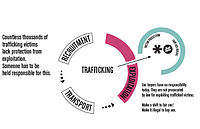
Photo from wikipedia
Background Globally, female sex workers (FSWs) have been identified as a high-risk group for human immunodeficiency virus (HIV) and sexually transmitted infections (STIs). However, as women of reproductive age, FSWs… Click to show full abstract
Background Globally, female sex workers (FSWs) have been identified as a high-risk group for human immunodeficiency virus (HIV) and sexually transmitted infections (STIs). However, as women of reproductive age, FSWs also have children. Few studies have investigated if financial responsibilities associated with motherhood increase women’s vulnerability to HIV and STIs among FSWs. Methods From March 2013 to March 2014, 603 FSWs aged ≥18 years were recruited from Tijuana and Ciudad Juarez (Mexico) to participate in a study assessing HIV/STI risk environments. Results Findings from logistic regression models indicate that FSWs who reported motherhood were more likely to report (in the past 30 days): a higher client volume (>30 clients) (adjusted odds ratio [AOR], 1.91; 95% confidence interval [CI], 1.27–2.87) and always using alcohol right before or during sex with clients in the past 30 days (AOR, 1.77; 95% CI, 1.19–2.61). In contrast, they were more likely to report consistent condom use for vaginal or anal sex with clients (AOR, 1.68; 95% CI, 1.10–2.55), less likely to report using drugs right before or during sex with clients (AOR, 0.38; 95% CI, 0.26–0.56) and less likely to have tested positive for STIs at baseline (AOR, 0.63; 95% CI, 0.43–0.91). Conclusions These results provide a glimpse of the complex relationship between motherhood and women who are sex workers. Understanding the convergence of motherhood and sex work and how this can influence a woman’s decision when engaging in sex work and affect her health is essential to designing effective programs addressing reduce risk for HIV and STIs among FSWs in this region and elsewhere.
Journal Title: Sexually Transmitted Diseases
Year Published: 2017
Link to full text (if available)
Share on Social Media: Sign Up to like & get
recommendations!